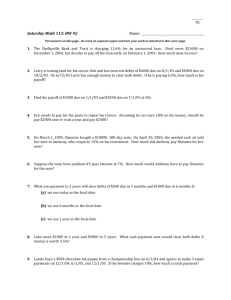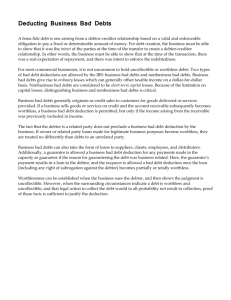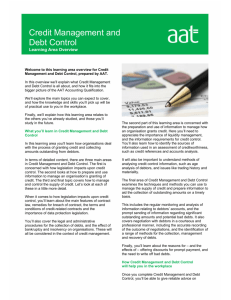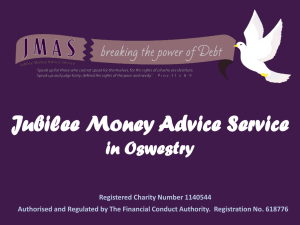Summary of Debts Written-off Under Delegated Powers
advertisement
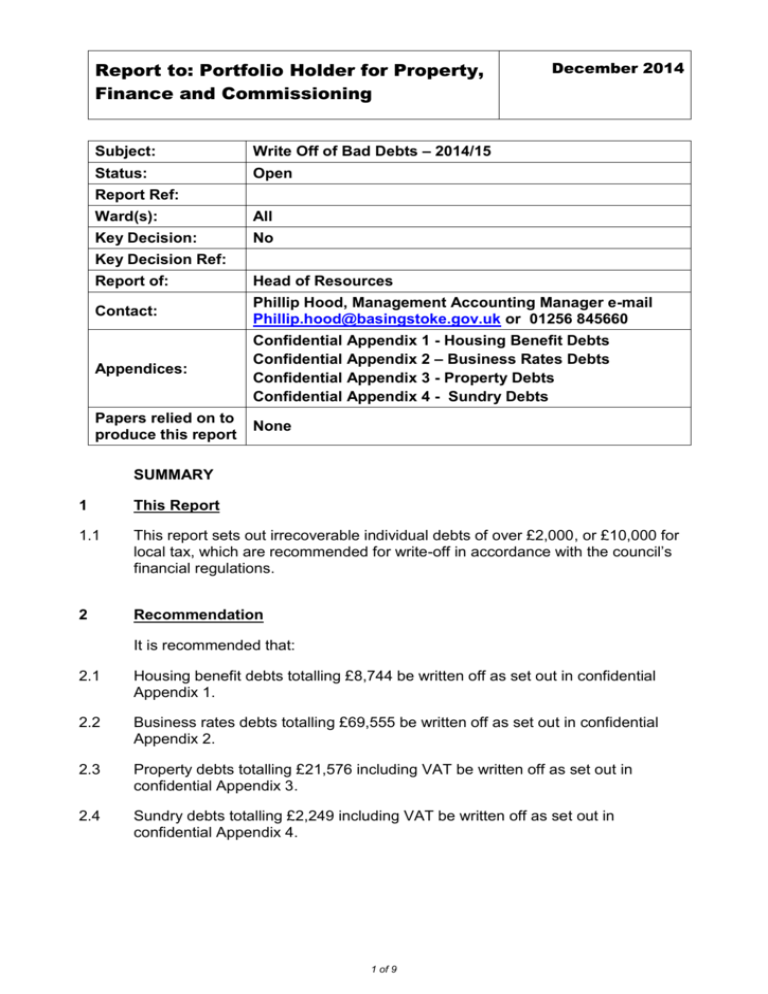
Report to: Portfolio Holder for Property, Finance and Commissioning Subject: Write Off of Bad Debts – 2014/15 Status: Open December 2014 Report Ref: Ward(s): All Key Decision: No Key Decision Ref: Report of: Head of Resources Contact: Phillip Hood, Management Accounting Manager e-mail Phillip.hood@basingstoke.gov.uk or 01256 845660 Appendices: Confidential Appendix 1 - Housing Benefit Debts Confidential Appendix 2 – Business Rates Debts Confidential Appendix 3 - Property Debts Confidential Appendix 4 - Sundry Debts Papers relied on to produce this report None SUMMARY 1 This Report 1.1 This report sets out irrecoverable individual debts of over £2,000, or £10,000 for local tax, which are recommended for write-off in accordance with the council’s financial regulations. 2 Recommendation It is recommended that: 2.1 Housing benefit debts totalling £8,744 be written off as set out in confidential Appendix 1. 2.2 Business rates debts totalling £69,555 be written off as set out in confidential Appendix 2. 2.3 Property debts totalling £21,576 including VAT be written off as set out in confidential Appendix 3. 2.4 Sundry debts totalling £2,249 including VAT be written off as set out in confidential Appendix 4. 1 of 9 PRIORITIES, IMPACTS AND RISKS Contribution to Council Priorities This report accords with the council’s Policy and Budget Framework and supports the development of an effective and efficient council. MAIN CONSIDERATIONS 3 Introduction 3.1 As part of the council’s debt management process, a report is produced annually to write off irrecoverable bad debts once all reasonable recovery procedures have been exhausted. The council’s financial policies ensure that an appropriate level of bad debt provision is maintained to finance these write offs. 3.2 Heads of Service have delegated authority to write-off individual debts under £2,000 (or £10,000 for local tax) but any larger debt write-offs require the approval of the Portfolio Holder for Property, Finance and Commissioning. 3.3 This report provides details of the total amount of debt written off under delegated powers during the first half of the year (i.e. up to 30 th September 2014) and then sets out the debts which are recommended for portfolio holder. 3.4 Following last year’s completion of a comprehensive exercise to analyse and where appropriate write-off large volumes of historic debts, the level of debt write-offs has reduced significantly during 2014/15. For example recommended write-offs for business rates have reduced from £173,363 to £69,555 and for housing benefit overpayments recommended write-offs have reduced from £78,491 to £8,744. 3.5 Over the past two years the Local Tax Team have made some large strides forwards and last year collected 98.5% of council tax and 98.6% business rates due in the year. An Audit Commission report published in November 2014 shows that this is top quartile performance for a district council. The council is also now dealing with 94% of all correspondence within 5 working days which means that billing can take place without unnecessary delay and recovery is more proactive. 3.6 A number of improvements have recently been introduced to debt recovery procedures including more severe remedies for Council Tax and Business Rates that are producing excellent results. During the first half of the year there were 5 committal courts with 17 people at risk of being sent to prison. Cash totalling £25,692 was collected from 11 residents, 5 people were given suspended prison sentences and 4 warrants of arrest were issued. Telephone debt recovery is also being carried out to increase payments and inform debtors that recovery action will be taken and visits are being made to business rates debtors. 2 of 9 4 Write-offs Agreed Under Delegated Powers 4.1 In addition to the amounts recommended for write-off by the portfolio holder, debts totalling £50,573 were written off under delegated powers between 1st April 2014 and 30th September 2014. As shown in the table below, this is a significant reduction from last year’s equivalent figure of £364,052. As explained above, this is partly due to completion of work last year to review the accumulation of historic debts, but enhancements to the local tax system have also enabled the write-off of credit balances of £121,687 in business rates and £71,710 in council tax relating to closed accounts where there is no trace and the council is unable to make repayments. 4.2 Unclaimed credits for council tax typically relate to closed accounts where people have moved out without applying for a refund of council tax paid in advance and have provided no forwarding address or bank account details to enable us to refund them. These people are issued with credit bills on several occasions. Credits may also be created through property banding changes by the Valuation Office, which can be backdated to 1991 and again there are no details of the whereabouts of the tax payer on closed accounts. When people with unclaimed credits cannot be traced, these balances will be written off. 4.3 Write off credits for non domestic rates (NDR) are similar to the above and usually arise where a business is no longer trading or there are changes in business rates liability or rateable values which mean that credits become available but there is no trace of the company or they no longer exist. 4.4 It should be noted that the figures below for council tax and business rates show the total debt written off rather than just this council’s element. The cost of council tax write-offs are shared by all precepting bodies (BDBC, HCC, fire and police) and this council bears approximately 9% of the amount written off. Following the introduction of the new business rates retention scheme in 2013, the council now bears approximately 40% of the cost of any business rates write-offs. Summary of Debts Written-off Under Delegated Powers: 2014/15 £ Reason Housing & Council Tax Benefit: - non-invoiced recovery from on-going benefit - invoiced recovery where benefits ceased Car Parking Council Tax Sundry Debtors Property Rents Business Rates Total 3 of 9 2013/14 £ 42,701 8,350 23,350 21,764 14,925 891 -61,408 41,454 87,233 19,479 169,141 2,617 511 43,617 50,573 364,052 4.5 The reasons for the delegated write offs in 2014/15 were as follows: Housing & Council Tax Benefit: Reason £ Non-invoiced £ Invoiced £ Total Non recoverable Hardship/LA discretion Bankruptcy Appeals Uneconomic to pursue Untraceable Deceased Joint debt approach Prison 20,696 15,255 1,343 2,556 1,860 246 0 746 0 0 241 2,016 0 333 4,098 1,078 107 476 20,696 15,496 3,359 2,556 2,194 4,344 1,078 853 476 Total 42,701 8,350 51,052 Car Parking: Between 1st April 2014 and 30th September 2014, a total of £23,350 was written off in respect of 270 Penalty Charge Notices (PCNs) that the bailiffs were unable to recover. An unpaid PCN is only written off, as opposed to cancelled, once it is registered at the County Court i.e. once all possible avenues of challenge open to the vehicle owner are exhausted. The number of write-offs increased by 20% or £3,871 compared to the same period in 2013/14 due to approximately 160 ‘warrants of recovery’ being returned in quarter 2 by a debt collection agency as unable to trace. As they had also exceeded the prescribed statutory time limit of 12 months these warrants were not recoverable. The agency concerned have now been reminded that any uncollected warrants should be returned after 6 months so that there is time to send them to an alternative enforcement agency for a second attempt at recovery before they expire. Council Tax: Reason £ Unable to trace (*) Bankruptcy etc Other Hardship/LA discretion Uneconomic to pursue Joint debt approach Deceased Credits written off 50,058 13,030 11,457 9,014 6,565 2,079 1,273 -71,710 Total 21,764 4 of 9 * The council uses a software tool to trace for all returned mail or if it is aware that someone has “gone away”. If searches come back successful and a new address is found, then documents are resent. The council also employs a tracing agent to find absconders and has recently introduced a new tracing agent similar to that used by the council’s fraud team. Sundry Debtors: Reason £ Debtors Whereabouts unknown Judgement Unenforceable Uneconomic to pursue Other Reason Hardship Company in Liquidation 10,865 1,162 849 833 756 460 Total 14,925 Business Rates: Reason £ Irrecoverable Bankruptcy etc Uneconomic to pursue Individual voluntary arrangements Unable to trace Unclaimed credits - 26,405 21,558 6,123 3,683 2,509 121,687 Total - 61,408 The council has recently introduced a new system to obtain information on the financial standing of new businesses and is using this information to tailor recovery action. Recovery actions also now include visits to businesses to promote discounts and collect rates. A new tracing agent for business rates is being piloted this year which provides greater scope to locate businesses. 5 5.1 Housing Benefit Write-offs Recommended for Write-off Overpaid benefit generally occurs for 3 reasons: (i) the customer delays advising the council of a change in their circumstances. (ii) claimants fraudulently claim housing and/or council tax benefit to which they are not entitled. (iii) the council delay the reassessment of a change of circumstances. 5.2 These debts can be recovered if the claimant would have known that they were receiving too much benefit e.g. an increase in salary. When the debt has been created as a result of a local authority error that the customer would not be 5 of 9 expected to realise, these are non-recoverable as prescribed in the Housing Benefit regulations. 5.3 Overpaid benefit is recovered via deductions from on-going benefit entitlement where housing benefit is still in payment. The maximum deductions allowed are prescribed by Government. In cases where entitlement to benefit has ceased, the debt is recovered via the sundry debt system which is within the local tax and benefits system (Civica Open Revenues) and is the responsibility of the Exchequer Team to collect. 5.4 Recovery action on overpayments is undertaken in accordance with Housing Benefit Regulations, and the council’s joint debt approach which has been agreed with Internal Audit. This can involve issuing reminders followed by referral to court or a debt collection agency. 5.5 At the time the overpayment is identified, the customer is given a statutory notice advising them of the reasons for the overpayment, an invoice informing them of the amount overpaid and methods of repayment available, together with information on their statutory right to appeal against the calculation. 5.6 Recovery action is withheld until the period of appeal has expired. A County Court Judgement (CCJ) can then be applied for or the debt can be referred to a collection agent (DCA). The Exchequer Team use information obtained from Civica Open Revenues to analyse the individual debts, develop a collection/recovery process and collection targets, and monitor the effectiveness of these processes. 5.7 Debts which have been created during the current financial year are recovered in accordance with a recovery action timetable, which ensures that unpaid amounts are referred to a debt collection agency within 10 weeks of the invoice being issued. 5.8 In addition to the write-offs under £2,000 set out in section 4 above, there are three debts totalling £8,744 that are recommended for write-off. These are detailed in Appendix 1, along with an explanation of the reason for the write-off. The last case for £2,117 relates to an individual who was still in receipt of benefit but in other two cases entitlement to benefit has ceased. 6 Business Rates Recommended for Write-off 6.1 As detailed in Confidential Appendix 2 there are three debts of over £10,000 for business rates which are recommended for write-off, for the reasons explained. The total value of these write-offs is £69,555. 6.2 The cost of these write-offs is shared between all precepting bodies (BDBC, HCC, fire and police) and the government, with this council’s proportion being 40% or £27,822. 6.3 To put the level of business rates write-offs in context, a total of approximately £73 million is due to be collected each year and write-offs, including those authorised by officers under delegated powers, amount to approximately 0.01%. Where write-offs are due to bankruptcy or liquidation, the Council remains as a registered creditor should there be any pay-out in the future. 6 of 9 7 Property Debt Write-offs Recommended for Write-off 7.1 The Property Services Manager ensures that every effort is taken to check the financial stability of potential tenants before a tenancy is granted, or a lease assignment approved, including examination of accounts, bank references, trade and landlord references and the use of rent deposits and guarantors, as appropriate to the circumstances. The payment records of tenants are constantly monitored, and both reminders and statements are issued. 7.2 If it becomes evident that a tenant is falling behind with payments they are contacted by a management surveyor, from Property Services, any problems are discussed, and the matter is pursued until a solution is reached. This may result in action such as agreement of a payment plan, charging interest, setting up standing order arrangements, using rent deposits, sending in the bailiffs, pursuing under tenants or previous tenants or guarantors, or re-possessing the premises. 7.3 Should these measures have no effect the matter is referred to the Head of Legal and Democratic Services for legal action for repayment of the debt with or without repossession of the premises. 7.4 In most cases these measures are sufficient to address the problem but inevitably some businesses fail. Businesses and individuals may file for bankruptcy, firms may go in to administration or liquidation and occasionally a tenant may become untraceable. 7.5 Procedures are in place to attempt to recover outstanding debts, which can extend over a number of years. However, there comes a time when it is clearly futile and uneconomic to attempt further recovery action and the debts are recommended for write off. 7.6 Where businesses fail either the Head of Resources or the Head of Governance deal with the administrator/liquidator as appropriate to register our debt and ascertain whether there are any funds to meet outstanding debts. 7.7 A review of bad debts has recently been undertaken across the Council’s property portfolio, to establish which debts are unrecoverable and should be written off. This has identified four debts, detailed in Appendix 3, totalling £21,576 which are recommended for write off. This includes VAT of £3,596 which the council can reclaim. Write-offs amount to approximately 0.1% of commercial property income, managed by Property and Facilities Management, which totals £15.2m. 7.8 Where write offs relate to company failures, contact with the administrator is maintained by Legal Services. Unless the council will lose the ability to reclaim VAT on write-offs because they are more four and a half years old, the council only agrees to a write off when a formal letter is received, stating that there will not be any distribution of funds to creditors. There are several cases on going with administrators where the council is unlikely to receive any money but until this is certain they will not be written off. 7 of 9 8 Options Analysis 8.1 The council does have the option of writing off more or less debt than is recommended by officers. 8.2 However, officers have undertaken an analysis of all outstanding debts and are recommending the write-offs listed in the appendices for the reasons explained. 8.3 Such action does not, of course, prevent the debt being resurrected and pursued if new information comes to light in the future. 9 Financial Implications 9.1 The council’s financial policies ensure that sufficient bad debt provisions are maintained and included in the council’s accounts each year. A 100% bad debt provision is maintained for all housing benefit overpayment debtors and for property and sundry debts over three months old. 9.2 The bad debt provisions are sufficient to meet the cost of the recommended write offs as detailed in the table below. The bad debt provisions are reassessed annually as part of the final accounts process to ensure appropriate levels are maintained. Bad Debt Write Off Provision Bad Debt Provision at 31/3/2014 Recommended Write-offs (excl VAT) Write-offs Agreed Under Delegated Powers Balance of Provision After Recommended Write-offs £'000 £'000 £'000 £'000 Property rents Sundry Debtors/Car Parking Hsg & CTax Benefit Council Tax Business Rates 10 371 257 1,422 2,308 600 4,958 18 2 9 0 173 202 1 38 51 22 -61 51 Risk Issues 10.1 In order to ensure that debt collection levels are maintained at a high level, it is important to ensure that Council policy is to rigorously pursue debts and only to write debts off when all reasonable recovery actions have been taken and they become uneconomic to pursue. 11 Corporate Issues 11.1 Human Resources (HR) Issues 11.1.1 There are no HR issues. 11.2 Equalities Issues 11.2.1 There are no equalities issues. 8 of 9 352 217 1362 2286 488 4,705 11.2.2 Legal Implications 11.2.3 There are no legal implications. 11.3 Any Other Implications 11.3.1 None 12 Communication and Consultation 12.1 The council will communicate its drive to recover debts and that writing off debts is a last resort only when pursuing them is no longer financially viable. 13 Portfolio Holder Comments 13.1 I am pleased to see the continued progress in our collection rates as a council. The much lower level of debt write offs is also a positive sign and demonstrates this council's determination to ensure that those who benefit from our services do so properly and pay their share of the costs in council tax etc. Making provision for write offs is never welcome but I am pleased that these are now much lower at, for example, 40% of the previous level for business rates and only 11% of previous council tax write offs 14 Conclusion 14.1 This report recommends that the debts contained in the attached appendices are approved for write-off by the portfolio holder as all reasonable actions have been taken to recover the debts and it is uneconomic to pursue them further. 9 of 9


